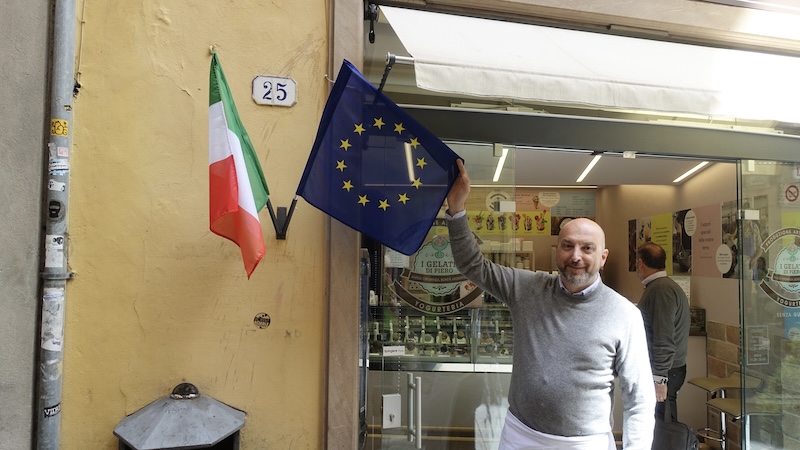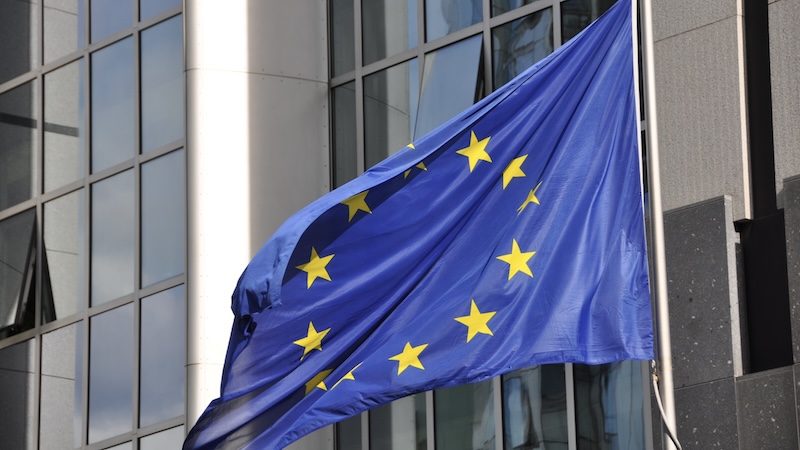Bombs Away
Larry J. Sabato writes about the 1964 campaign trail.
The Johnson-Goldwater campaign set the standard for all campaigns to follow. It was nasty, negative, personal and defined by unforgettable, vicious advertisements.
Most campaigns from earlier decades have long ceased being relevant tour politics today. Not so in the case of the 1964 White House matchup that rolled the waters throughout the nation and here in Virginia.
GOLDWATER HAD LITTLE CHANCE OUTSIDE THE SOUTH – AND VIRGINIA
It actually matters whether the presidential nominees like and respect each other. LBJ and Goldwater had spent years together in the Senate, and they developed a deep antipathy that bore bitter fruit when they finally faced off. Goldwater even picked an obscure congressman from New York state, William Miller, as his vice presidential nominee because Miller apparently had gotten under Johnson’s skin with his criticisms — and Goldwater wanted to unnerve LBJ as much as he could.
Goldwater had hoped to run against John F. Kennedy. Despite deep policy differences, JFK and Goldwater were friendly, and Kennedy had mentioned to Goldwater that the two might fly around in Air Force One, debating at various stops in the fall of ’64. President Kennedy never had the opportunity to follow through, of course, and his assassination in Dallas on Nov. 22, 1963, was the real beginning of the 1964 campaign.
It’s hard to believe now, but at first, some analysts speculated that LBJ might be just an interim president; as a Southerner, he would allegedly be too conservative for most of the Democratic Party. Johnson took care of that image with his quick, aggressive push for civil rights, awar on poverty and other liberal causes. With his unquestioned mastery of Congress and particularly the Senate, Johnson built a legislative record in just one year that was greater than many presidents who had served a full term or more.
The truth is that America was almost certainly not going to have three presidents in little more than a year. All seven of the vice presidents who succeeded to the presidency prior to LBJ, from John Tyler in 1841 to Harry Truman in 1945, had served at least several years, and three (Theodore Roosevelt, Coolidge and Truman) had won full terms of their own. LBJ’s honeymoon and the need for continuity after the national trauma of Dallas conspired to smother GOP ambitions.
Early on, Republican had hopes of winning the entire South, thanks to Johnson’s successful efforts to pass the Civil Rights Act of 1964, the strongest such bill since Reconstruction. They fully expected to win the Old Dominion, with its small, heavily white conservative electorate that had voted Republican for the White House in 1952, 1956 and 1960. None of those Virginia contests was close. But Virginia surprised them in 1964, as we’ll discuss in the accompanying article.
Only Goldwater diehards ever believed he had a chance to win the presidency. Even Barry Goldwater knew his cause was hopeless. First, Goldwater was perceived as an “extremist,” a charge he answered at the GOP convention in San Francisco by saying, “…[E]xtremism in the defense of liberty is no vice … [M]oderation in the pursuit of justice is no virtue.” Of course, his response reinforced the view that he was extreme. So did his slogan, one that Goldwater personally selected against the advice of many staffers: “In your heart, you know he’s right.” The term “right” subliminally cornered the Republican ideologically. Almost immediately, Democrats concocted their parody, “In your guts, you know he’s nuts.”
While no Republican was going to beat President Johnson, virtually the entire Eastern establishment of the GOP barely lifted a finger for the nominee. The moderate candidates he had defeated, such as Gov. Nelson Rockefeller of New York and Gov. William Scranton of Pennsylvania, were determined to see Goldwater crash in flames, so the GOP would learn its lesson about putting forth a nominee so conservative. In fact, Republicans would temper their ideology for several future elections, choosing relative moderates Richard Nixon and Gerald Ford in 1968, 1972 and 1976.
In 1964, though, Republicans had to pay a sizable price for their selection of Goldwater. Down ticket, there was a slaughter in many places. Democrats soared to 295 seats in the U.S. House of Representatives (a gain of 37) and secured an eye-popping 68 seats in the Senate — the last time either party has had a two-thirds majority in the upper chamber. LBJ got the legislative numbers he needed to launch his “Great Society” programs.
Lyndon Johnson was blessed with prosperity in ’64, plus a shaky Cold War peace more or less held through the election, despite the surprise overthrow of Soviet Premier Nikita Khrushchev in October. LBJ made sure Goldwater had little room to the president’s right on Communism. The saber-rattling Tonkin Gulf Resolution on Aug. 7, 1964, enabled the president essentially to wage war in Vietnam as he saw fit and permitted him to project toughness. Of course, most Americans would come to regret that resolution and the unbridled authority it gave the president to build U.S. troop strength in Vietnam to an incredible 535,000 troops (with about 2.5 million Americans eventually serving in Southeast Asia). One of the great ironies of the 1964 campaign was LBJ’s posture as “the peace candidate” who pledged not “to send American boys 9 or 10,000 miles from home to do what Asian boys ought to be doing for themselves.”
THE ‘DAISY’ AD
Part of Johnson’s campaign was bland, with inoffensive slogans like “LBJ for the USA” and “All the Way with LBJ.” But the heart of his drive for a massive victory was the deconstruction of Goldwater. He accomplished this by using a series of “bombs away” television spots, unmistakably suggesting that a Goldwater victory would be a prelude to nuclear war. Goldwater himself had created some credibility for these spots, with opposition to President Kennedy’s Nuclear Test Ban Treaty, loose talk about using tactical nuclear weapons in Vietnam, terming the bomb “merely another weapon,” and joking about lobbing a nuclear bomb “into the men’s room at the Kremlin.”
As a result, LBJ’s toughest commercial, the famous (or infamous) “Daisy” ad, didn’t even have to mention Goldwater’s name to provoke a visceral response. The Daisy spot is iconic — a little girl pulling petals off a daisy and counting to 10, until her voice is overridden by a missile-launch countdown and she is consumed by a nuclear blast. The ad concluded with a mini-sermon in a voiceover by Johnson: “These are the stakes: To make a world in which all of God’s children can live, or to go into the dark. We must either love each other or we must die.” This spot aired only once because Johnson ordered it off TV after a strong reaction even from friends, who thought he shouldn’t rock the boat with his electoral tidal wave approaching.
Yet many commercial variations of Johnson’s theme were shown on television daily. For example, a flashing red phone, allegedly the “hotline” between the U.S. and the Soviet Union, beeped loudly as a narrator intoned, “This particular phone only rings in a serious crisis. Keep it in the hands of a man who’s proven himself responsible.” Actually, at the time, the hotline wasn’t a phone at all, but a telex system for instant written communications. Facts have always been the first casualties in presidential battles.
Goldwater went after Johnson with equal zeal, slamming the president for alleged financial misdoings as well as scandals that stretched back to the Texan’s disputed election to the Senate in 1948. One memorable TV commercial laid out the charges against Johnson, and then actors playing father and son were seen in a living room. The boy asks, “Will you and mother vote for a man like that?” Dad solemnly responds, “We won’t. We can’t, for your sake.”
Judging by the November 3 results, there weren’t too many fathers like that. Lyndon Johnson achieved the largest popular vote victory of any president up to that time (61 percent), managing to edge even his hero, President Franklin D. Roosevelt, who received a shade under that in his big 1936 triumph. The Electoral College vote was 486 to 52, with Goldwater carrying only five Deep South states plus his native Arizona.
THE LEGACIES OF GOLDWATER AND JOHNSON
This was by no means the end of Barry Goldwater. He returned to the Senate in 1969 and served until early 1987. Goldwater helped to convince an impeached President Nixon to resign in August 1974, before the Senate could convict him (as was certain). And somewhat surprisingly, Goldwater became a social liberal on issues such as abortion and gay rights. He had always been somewhat libertarian, but his frank public comments on these controversial topics turned many Christian social conservatives against him in the latter stages of his political career.
As for President Johnson, his achievements in the domestic arena live on. Perhaps the most significant bill passed during his tenure was the Voting Rights Act of 1965, which finally enfranchised millions of African-Americans who had been kept off the voting rolls in the South — and in some parts of the East and West as well. Tragically, Johnson’s presidency was ruined by his disastrous handling of the Vietnam War, including his policy of gradual escalation that permitted the enemy to keep up and his tendency to get too involved in the military details (including personally designating bombing sites). Over 58,000 Americans eventually lost their lives in the jungles of Southeast Asia in a war that stretched through three entire White House terms (JFK’s, Johnson’s and Nixon’s first). LBJ’s own party turned against him in 1968, and he retired rather than face probable defeat and continued deep divisions in the country. The ongoing 50th anniversary of the Johnson presidency is giving all of us the opportunity to review his successes and failures and perhaps to re-evaluate this complicated man whose legacy is very mixed.
Larry J. Sabato is director of the Center for Politics (centerforpolitics.org) and University Professor of Politics at the University of Virginia. His most recent book is The Kennedy Half-Century, a New York Times best-seller newly released in paperback. He can be reached at sabato@virginia.edu.
… Virginia’s Unexpected Role in the Landslide
BY LARRY J. SABATO
Given the strong opposition of Sen. Harry F. Byrd Sr. and the entire Virginia congressional delegation to the Civil Rights Act and LBJ’s proposed “Great Society,” many observers suspected at first that the Old Dominion might lean Republican.
Certainly, Byrd preferred Goldwater, who had voted against the civil rights bill. Byrd didn’t endorse Goldwater outright, however. The conservative Democratic Byrd Organization, the state’s dominant political entity since the 1920s, had been practicing “golden silence” in presidential contests since 1948 — a signal to its supporters that it was perfectly all right to vote GOP for president and Democrat for state offices. (Truman won Virginia in ’48 anyway.) No doubt Virginia’s senior senator thought his silence was enough to deep-six LBJ, as it had been for the three previous Democratic White House nominees.
Byrd even asked Goldwater not to campaign in Virginia since Byrd, standing for what would become his final election, was technically on the same ticket as LBJ. Instead, segregationist Sen. Strom Thurmond of South Carolina, the 1948 “Dixiecrat” party candidate for president and a new convert to the Republican Party, was dispatched to drum up support for Goldwater in the Old Dominion.
THE CRUMBLING OF THE BYRD MACHINE
Nonetheless, the turn toward a New Dominion had begun and would prove unstoppable. Harry Byrd’s control of Virginia was being undermined by forces he could not control, from sizeable urban growth that cut against the organization’s rural base to expansion of the electorate — meaning the voter registration of large numbers of urban dwellers, African-Americans and many poor and middle-class whites.
The 24th Amendment to the U.S. Constitution, ratified in January 1964, abolished the poll tax — a device used for generations in the South to restrict the size of the electorate. This explains why Virginia’s turnout for elections in most of the 20th century was disgracefully low, only about a quarter of the eligible adults. An aggressive, post-poll tax registration effort in ’64 added tens of thousands of new voters to the rolls across Virginia, the vast majority of them not aligned with the Byrd Organization.
By October national polls clearly indicated that LBJ had a margin so large that Virginia might well return to the party it had backed from 1876 to 1948, with the sole exception of 1928. (Virginia voted for Republican Herbert Hoover because the Democratic nominee, New York Gov. Al Smith, was opposed to Prohibition.)
The so-called “Lady Bird Special” greatly assisted President Johnson at just the right moment. This whistle-stop train tour through eight Southern states in October was undertaken by the first lady and the Johnson daughters. Mrs. Johnson was well regarded in Washington even by many who opposed her husband.
Just as important, ambitious politicians in Virginia could see that the times were changing. One of those aspiring politicians was Lt. Gov. Mills E. Godwin Jr., a Byrd Democrat who wanted to run for governor in 1965. Godwin had supported Massive Resistance and the 1959 closing of the public schools in several Virginia localities to avoid desegregation, and thus he potentially was facing a difficult gubernatorial primary challenge from a moderate or liberal opponent. Godwin shocked the political world, and many of his Byrd allies, by hopping aboard Lady Bird’s train, literally and figuratively. Other pragmatic officeholders did the same, including Gov. Albertis S. Harrison Jr., but Virginia’s one-term limit for governor meant that Godwin, already maneuvering energetically to succeed Harrison, was the real headliner.
This was a classic, tacit deal that paid off for President Johnson in November 1964 and then Godwin the following year.
THE START OF VIRGINIA’S ‘SWING STATE’ STATUS
Johnson captured Virginia’s 12 (now 13) electoral votes, with a turnout more than a third larger than in 1960, topping one million for the first time ever. Still, LBJ’s winning percentage (53.5) was far below his national proportion. This was yet another indication that the Old Dominion of this era was well to the right of the country as a whole.
Remarkably, though, Godwin won Virginia’s big prize, the governor’s mansion, with no opposition at all in the 1965 Democratic primary, which was still “tantamount to election” for state offices then. The general election was closer than usual because some Byrd and Goldwater supporters were still miffed with Godwin and ran a conservative independent who won 13 percent. But Godwin handily defeated the Republican gubernatorial candidate, A. Linwood Holton Jr. Of course, Holton would be back, in 1969, to end Democratic dominance in Richmond and win the contest to succeed Godwin. (In 1973, Godwin was again elected governor, this time as a Republican, accenting the changeover in the Virginia political landscape.)
Fifty years on, neither Virginia nor the United States as a whole much resembles the state and nation that existed in 1964. Yet there is no doubt that long-ago presidential election shaped the society we live in today. The modern ideological divide between a liberal Democratic party and a conservative Republican party first came into sharp focus in the face-off between Lyndon Johnson and Barry Goldwater. Highly negative TV ad programs continue to define our campaigns at all levels. Virginia’s role as a swing state with an electoral majority based in urban and suburban locales, not rural areas, had its electoral roots in the political upheavals that produced LBJ’s victory.
The 1964 contest was an election to remember, and its effects are with us still.
This fall, the Center for Politics at the University of Virginia and the Community Idea Stations of Central Virginia will release a documentary on the 1964 election, “Bombs Away,” on PBS affiliates throughout the nation. Check local listings – and watch the trailer here.


